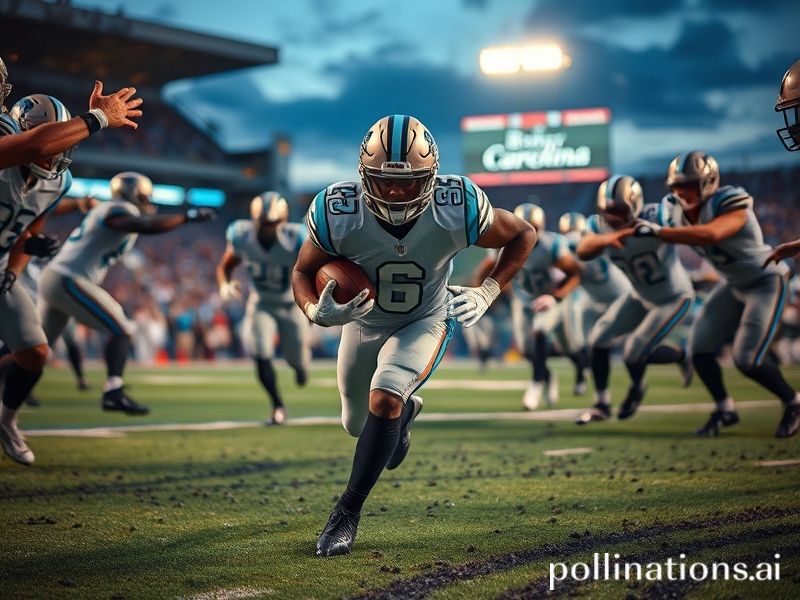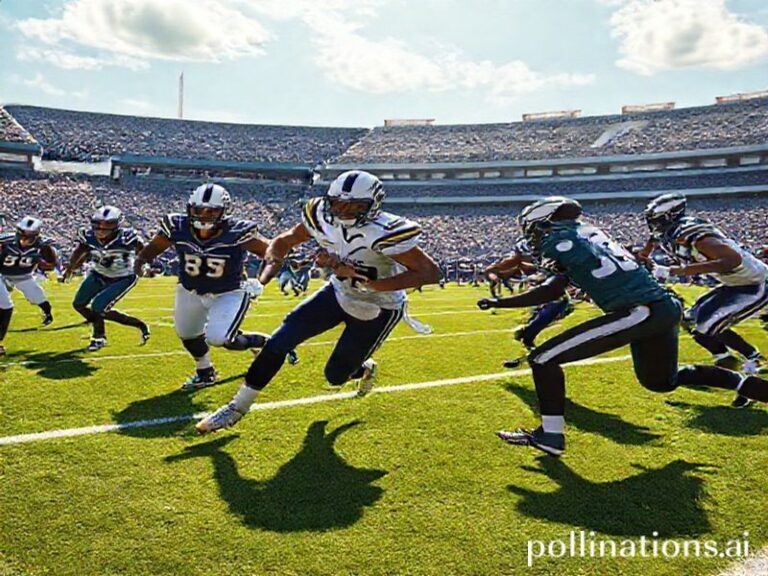Miles Sanders and the Global Economy: How One NFL Cutback Moves Markets from Lagos to Lahore
The World According to Miles Sanders
A dispatch from the global bureau of running backs, currency fluctuations, and existential dread.
By the time Miles Sanders ripped off a 42-yard touchdown against the Bears last season, the yen had already slipped to a 34-year low and a container of kimbap in Seoul cost more than a bottle of mid-tier Bordeaux. These facts are, of course, unrelated—until you remember that the NFL’s broadcast rights feed directly into the balance sheets of Japanese ad agencies, Korean chaebols, and the sovereign wealth funds that keep half of Europe from having to raise the retirement age past 67. One cutback in Charlotte, it turns out, can nudge a pension fund in Düsseldorf. Sanders would probably shrug at the causality; he’s busy trying to remember whether the Panthers still have a functional offensive line.
From Lagos to Lahore, the export of American spectacle has become the last reliable U.S. commodity not subject to tariffs, sanctions, or moral panic. Sanders—born in Pittsburgh, schooled at Penn State, now gainfully employed in the sovereign state of Bank-of-America-Stadium—is therefore a minor node in the empire’s soft-power grid. When he jukes a linebacker, a teenager in Nairobi wearing a counterfeit CMC jersey spills Fanta on his phone. The spillage enters GDP calculations via replacement-screen sales; somewhere, an economist updates a regression model and quietly thanks Christian McCaffrey for the spillover demand. Sanders, the understudy turned lead after CMC’s trade, inherits both the jersey royalties and the burden of symbolism.
Consider the broader ledger. The Panthers signed Sanders in 2023 for four years and $25 million, roughly the cost of two second-hand F-16s from the Belgian boneyard or a week’s worth of Russian diesel before the sanctions haircut. Viewed through the lens of comparative military purchasing power, Sanders is either a bargain or a frivolity, depending on whether you sit in Congress or in the Khartoum ministry of defense trying to keep the lights on. Either way, the money is printed in Washington, funneled through Charlotte, and—after agent fees, escrow, and North Carolina state tax—re-enters the global bloodstream via offshore accounts, NFT marketplaces, and the occasional charitable gesture that buys goodwill in Sierra Leone. American football, like American arms, runs on the same accounting firm; only the collateral damage differs.
Meanwhile, the fantasy-football industrial complex has colonized time zones where the sport itself remains mystifying. In Manila call centers, graveyard-shift workers draft Sanders in dynasty leagues between customer-service chats about forgotten passwords. They will never see an NFL game live—the kickoff coincides with Monday morning jeepney traffic—but they trade him like pork-belly futures because ESPN’s algorithm says his red-zone usage is “trending up.” The abstraction is complete: a player becomes a ticker symbol, divorced from turf, sweat, or the mild existential panic of getting tackled by 250 pounds of incentivized violence.
This is not to say Sanders lacks agency. After all, he chose the Panthers over the Eagles’ nostalgia tour, thereby rejecting the city that once papered over its own infrastructural decay with Super Bowl confetti. Philadelphia responded by signing D’Andre Swift, a transaction that barely dented the city’s murder rate but did move the needle on regional beer consumption. Sanders, for his part, now jogs out of tunnels beneath palm-tree murals commissioned by a billionaire hedge-fund refugee who once shorted the Thai baht for sport. Somewhere in that sentence lies a metaphor for late capitalism, but the PA system is blaring “Sweet Caroline,” and introspection rarely survives at 120 decibels.
What does the planet learn from Miles Sanders? First, that even the most parochial American ritual is now braided into the fiber-optic sinews of the world economy. Second, that we will watch anything—especially if it distracts us from the slow-motion unravelling outside the stadium gates. Third, that a 5-foot-11, 210-pound human can still outrun, at least momentarily, the gravitational pull of geopolitics. The catch, of course, is that gravity always collects on the second contract.
When the final whistle blows, the lights dim, and the stands empty into the humid Carolina night, Sanders will board a team bus that runs on the same petrodollars financing yacht races in Dubai. He’ll scroll through messages from fans in São Paulo and Stuttgart, each convinced he plays exclusively for them. And for a few seconds, somewhere between the stadium exit ramp and the hotel lobby, the world will feel improbably small—just a man, a phone, and the faint, flickering illusion that any of us can outrun the closing lane.







